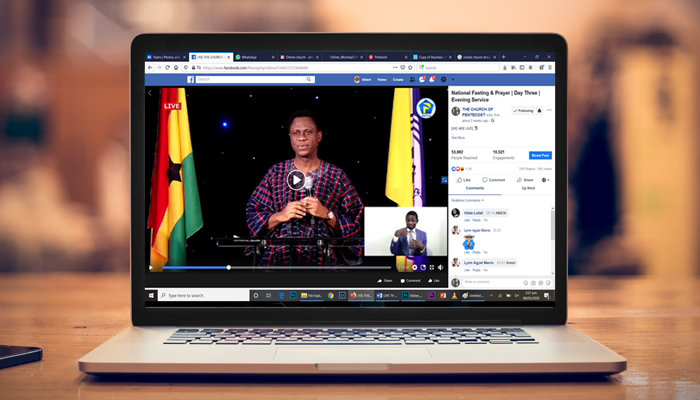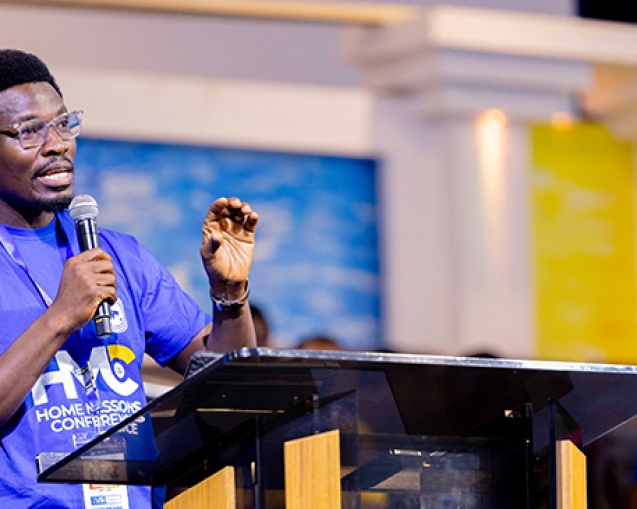On March 15, 2020, the President of the Republic of Ghana, His Excellency Nana Addo Dankwa Akufo-Addo, announced a four-week ban on all public gatherings including conferences, workshops, funerals, festivals, political rallies, church activities and other related events, as part of measures to stop the spread of novel Coronavirus (COVID-19); a common enemy which all the nations of the world are at war against. For some of us, although, we had heard the President’s directive and understood why such stringent measures ought to be put in place, we still could not come to terms with it. This was because it was almost impossible to imagine our lives without the routine of fellowshipping with our brethren in Church. As we pondered over this new reality, one thing that was for sure was that the weeks ahead promised to be quite interesting ones.
Just like many others, I did not really feel the impact of the ban until it was Sunday morning. I had gotten out of bed early as usual and begun my preparations for the first service at 7:00 am, only to be prompted by my wife that there was not going to be church service due to the Government-imposed ban on public gatherings. It was actually at that point that it dawned on me that we are indeed “not in ordinary times.”
Consequently, we held our family service that morning, which was quite weird for a Sunday Service because it was devoid of our usual hot tempo Pentecostal praises and fellowship with the church members. Soon, this reality dawned on the entire Ghanaian populace especially the Christian community. As a result, all churches, both big and small, began to explore various opportunities and avenues to reach out to their members during the one-month lock-down period. For most, the obvious and seeming effective avenue was to go online; yes, Online Church Service!
For churches who had already embraced the use of technology in the propagation of the Gospel and built an online community and presence, it was not too much of a challenge, but even with them, it was a new experience preaching to a virtual audience without the usual responses of AMEN and HALLELUYAH from the congregation to spur the preacher on.
That morning, I monitored several online platforms and resources, and was blown away by what I observed. From the most sophisticated technological devices to perhaps the “Nokia 3310s,” almost every church seemed to be streaming the Sunday Service online. The broadcast feeds were so rampant on Social Media as though any church that did not hold an online church service would incur the wrath of God.
Due to the traffic of online services, I decided to hold my first online service in the evening. Of course, this came as no challenge at all because of the huge investment my church had already made in the use of technology and digital media to reach the online space.
My only challenge was how our Sling Studio (a device used for live-streaming purposes) had developed a fault just a week to the ban. I didn’t know whether to blame the devil, poor handling or to simply consider it a mere coincidence. But lo and behold, I held a very good online service and was able to reach out to my church members as well as other online audiences.
The following day, I received a phone call from one of my aged members. According to her, she had tried to join the online service, but try and search as she did, she could not access the feed and participate in the service.
As someone who has over the years learned to use these devices without struggle, it did not occur to me that my grandparents, or anyone else who was not tech-savvy, would have difficulties participating in online services, although I had taken my time to take the entire church through these rudiments. This was perhaps because the switch to online services came at a point in time when the Body of Christ was ill-prepared for such an abrupt change in the status quo.
Subsequent calls I received from my fathers, mothers, colleague ministers and the general church populace as to how they can go online got me thinking – Was it that our Reporters and Media Coordinators at the various levels of the church had not educated their constituents after participating in the various training workshops organised by the Publications Office and the Media Ministry? Or were some Church Leaders still not interested in using modern tools to propagate the Gospel even after several calls by the leadership of The Church of Pentecost for them to do so?
As a result, I had to encourage my members who were technologically-inclined to assist them in the use of these digital tools and urged them to help their relatives and friends, particularly the elderly, on how to access the broadcast links sent to them. These efforts have paid off as some of the old folks, some 60 years and over, can now use the Zoom application. Efforts are still being made to get the majority of the over 800 church members of the Church to participate in the church’s online services.
Fast forward, merely three weeks into the ban on public gathering, I can certainly conclude that churches have completely moved online. Now, almost all churches have adopted online services regardless of the views or reservations they might have had about virtual services before COVID-19. At the moment, it seems online service is the ONLY way to go. That is to say that, the church, in this critical time, has been left with two options, either to move online or flout the Presidential directive, and those who have opted for the latter have paid dearly for their actions.
Since Online Church is the new craze now, I would like to throw more light on the phenomenon. Online church or Cyber-church simply refers to a wide variety of ways that Christian religious groups can use the internet to facilitate their religious activities. Over the years, the internet has emerged as a place for religious experience. This has, however, raised questions in the area of ecclesiology because some Christian traditions insist that online gathering cannot be considered a real church. Interestingly, those who hold such views were the first to direct their churches to use online platforms to reach out to their members during this pandemic.
Online churches started to gain popularity in the early 2000s. Since then, they have prospered dramatically due to institutional investment, mobile technology and the power of Social Media.
The Church of Pentecost, for instance, earnestly responded to the online church phenomenon in 2016, when the church adopted “Hearing and Obeying the Lord’s Voice in My Generation” as her theme for the year. The Apostle Prof. Opoku Onyinah-led Executive Council pushed for the use of modern technologies to be incorporated in the church’s culture. This had been advocated by many people in the Church especially at the various campuses whose members were drifting to the charismatic churches after school just because some of the “local churches” were opposed to adopting new technological trends and did not even see the importance of a projector.
The conscious efforts made by the leadership of the Church to incorporate technological advancement in church services is what has resulted in The Church of Pentecost being acclaimed as one of the most active churches on Social Media at present. The establishment of Pent TV also came about the same year due to the sustained campaign for the church to go all out in using the media to propagate the gospel of Jesus Christ.
This divine move by leadership has boded the Church well in recent years, especially in this critical time we find ourselves. Today, it easily goes without saying that Pent TV and Social Media, have emerged as a lifeline for the Church, providing an avenue for the propagation of the unadulterated word of God and to an extent sustaining fellowship among brethren. All Glory to the Almighty God who continues to grant our leaders wisdom to know, understand and navigate the times. “Nyansabuakwa Nyame “(the Omniscient God) continues to reign in His church.
In this day and age, you can experience everything that goes on in the physical church without necessarily walking through a physical door. The digital media has become a ministry tool, despite its well-earned bad reputation for being an unrealistic representation of real-life and a stage for cyberbullying. We can “go to church” by listening to a sermon podcast while driving or just taking a stroll.
Social Media which is perhaps the engine for online ministry has become part of our everyday lives. It is almost impossible to go through a day or function effectively without it. The impact of Social Media has become so enormous that it has outgrown its initial purpose of being a platform merely for social engagements and entertainment.
For majority of this contemporary generation, the internet is not just a tool for acquiring knowledge or entertainment, but a place where they practically live their lives.
Statistics on Social Media activity in contemporary times is quite jaw-dropping and incredible. In fact, the Global Social Media Research Summary released by Smartinsights.com this year revealed that more than 4.5 billion people are said to be active internet users within every hour of the day. The year 2020 alone has recorded 321 million new internet users.
The findings also reveal that nearly 60% of the total global population are active Social Media users. That is more than half of the world’s population!
Since time immemorial, various forms of technology have been employed by early believers in disseminating the Gospel message of Christ. Even in the days of Paul the Apostle, his use of the ink and the scroll was seen as high-end technology at the time. This proves that Technology has always been with us, and it has helped with the dissemination of the Gospel. In this dispensation, Social Media is the technology which the Lord has provided for Christians to aid our evangelistic efforts.
It was quite difficult for some church leaders to embrace online ministry as a real ministry but COVID-19 has taught the church a hard lesson. Often, crisis serves as the defining moment to facilitate change. Christian worship is no longer limited to a building, but people coming together in prayer and living their faith. Current statistics indicate that more people watch online service compared to the church attendance recorded before the lockdown. Perhaps, this is due to the quest for people to reconnect to God due to the several theories associated with the pandemic or the lack of activities due to the lockdown.
But be as it may, online services are offering more people who hitherto were not attending church service the opportunity to experience congregational fellowship from the comfort of their homes. In the absence of physical fellowship, the digital church has seen significant growth within this period. Church life has changed; but more importantly, there has also been an attitudinal change towards the use of technology in church life. This is because, as a result of the pandemic, churches have learned to find creative ways to reach out and make themselves relevant to their members.
Even as we pray for God’s intervention in the COVID-19 pandemic, I believe that our perspective of the church will drastically change post-COVID-19. The Church has moved online and must stay online. We must push the gospel in all frontiers to fulfil the Great Commission.
Though I am free and belong to no one, I have made myself a slave to everyone, to win as many as possible. To the Jews I became like a Jew, to win the Jews. To those under the law, I became like one under the law (though I myself am not under the law), so as to win those under the law. To those not having the law I became like one not having the law (though I am not free from God’s law but am under Christ’s law), so as to win those not having the law. To the weak I became weak, to win the weak. I have become all things to all so that by all possible means I might save some. I do all this for the sake of the gospel, that I may share in its blessings.
(1 Corinthians 9:19-23 NIV)
Isaac Annor
Publications Manager (The Church of Pentecost)
Student of Digital Theology.


















